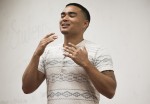In 2013, Sy Stokes released a spoken word video, “The Black Bruins,” that garnered national attention. The video featured Stokes and members of the Black Male Institute, an organization dedicated to researching educational opportunities for black men, who cited statistics about the number of black students at UCLA.
READ MORE: Student posts video to spark discussion about lack of diversity at UCLA
Stokes, who was an African American studies student, graduated from UCLA in March, but returned to campus to perform spoken word poetry at an event held by Students for Justice in Palestine on Wednesday. In September, he also spoke at “Rehearsal for Bruin Life” – an event hosted by UCLA Student Affairs intended to spark discussion about cultural sensitivity.
The Daily Bruin’s Kiera Kosciolek spoke with Stokes about his life post-college and the reactions to the “Black Bruins” video.
Daily Bruin: What have you been working on since graduating from UCLA?
Sy Stokes: I was rejected from 21 jobs before a nonprofit gave me a chance. But I was sitting behind a desk and it didn’t feel like I was helping anybody, so I quit in October. It turned out the position for director of education at the Boys and Girls Club of El Sobrante (an organization focused on providing educational activities for children without a place to stay after school) was open. In a way I came full circle, because I used to go there when I was a kid. I grew up in there, learned how to play basketball there and now I’m the director of education.
DB: You mentioned you want to work in education. What do you hope to accomplish in education?
SS: I’m applying to master’s general education programs right now. UC Berkeley is the end goal. It’s close to home, I grew up around that area, and to have that resource right next to my house – I’ve got to get in.
DB: Once you were at UCLA, you mentioned you began to feel isolated as a black student and released the “Black Bruins” spoken word video to address some of the issues you noticed on campus. What was the community’s reaction to the video?
SS: I got hate mail from outside UCLA and all over. From UCLA in particular, it was primarily anonymous. UCLA students (wrote comments) on whatever platform you could be anonymous on because obviously they didn’t want to say it in person.
DB: How did the administration react to the Black Male Institute’s participation in the video?
SS: When it came down to it, we only had two people from the administration help us out – Associate Vice Chancellor Youlonda Copeland-Morgan and Vice Chancellor Janina Montero. They tried to get us funding and helped us with grant-writing (and) raising awareness on campus. The Black Male Institute went from 11 of us in that video to almost 50 men. When I went back to visit (the Black Male Institute), I didn’t know it was them – I thought it was a class in session (because it was so large). It’s good to know that other people are interested.
DB: After the release of video, did you see a substantial change on campus?
SS: The diversity requirement that was just passed was our primary goal. There were obviously a lot of other student groups that helped push it, but I think the video and the things that we were doing were the primary reasons.
Gene Block said in a press release that the efforts of a student who made a viral video about the lack of diversity pushed them to do this.
It was kind of cool to get that recognition. To know it was the push that made that happen and we achieved our primary short-term goal was more than we could ever ask for. We still have many long-term goals, but those are (works in progress).
